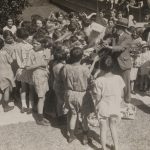Our side of the story
- Jun 17, 2016
- In Features
Care Leavers share with me their shock at some of what we find in our records. The language hits us between the eyes. Our counterparts in the nineteenth century were tagged by a battalion of adjectives: criminal or neglected, destitute, abandoned, deserted, unkempt, illegitimate, wayward, slovenly, deserving or undeserving.
When the makers of records ran out of adjectives, they paraded a platoon of nouns: vagabonds, vagrants, urchins, waifs and strays, delinquents, slum kids, wards.
And a squadron of slogans: street Arabs and youthful Bedouins, orphans of the living, out of control, lapsing into immorality, being without sufficient means. It shocks us to learn that we, the children, were charged with being in need of care and protection.
The language reflects an unholy union between the welfare and penal systems: when we were little children we were charged and committed, released on probation (if we were lucky), and eventually discharged. Some of us were sentenced to solitary confinement and even to floggings. If we ran away, we were listed as absconders in the Police Gazettes until we were captured.
Many of our substitute parents didn’t think much of us. They expected the worst. In one of the orphanages I grew up in, the management made it clear that “parents and guardians who labored under the impression that all Orphans, without regard to legitimacy, morals or respectability” would be taken in had better think again. No child would be admitted to that place without a marriage certificate showing the father’s name, the child’s birth certificate, and a doctor’s certificate declaring that the child was free of contagious diseases. The ‘undeserving’ would have to go elsewhere.
Like one-time British Prime Minister, Margaret Thatcher, many in the Australian welfare system believed that family crisis resulted from individuals’ personality defects. Poverty was their own fault, they claimed. The records explain very little about the social conditions in which our parents made heart-breaking decisions to put their children in the ‘care’ of the welfare people.
We find nothing in the archives that explains the story behind the story – the misery of grinding poverty that dogged the lives of working-class parents who, with little schooling, found themselves trapped in long-term unemployment and unstable accommodation, or enmeshed in military service or domestic violence or chronic illness.
These hardships – often hitting families more than one at a time – placed unbearable pressures on families. In the absence of support, many did not have the resilience in a crisis to survive. Our parents were sometimes the subject of the most vile slander by those who had never known hardship themselves. Some parents were accused of being keen to be rid of their children – and only sought to have them returned when they were old enough to earn a living. Chronic poverty is not about a lack of moral character. It’s about not having money, resources and support in your time of greatest need.
Many of us find our personal records are almost entirely negative. Sometimes they incorporate police reports that, by definition, were aimed at winning a conviction. From that poor start, welfare workers recorded only problems. Care Leavers often search their records in vain for positive achievements, but the archives are brimming with examples of our minders’ low expectations. Some of us who are perfectly intelligent have found in our records that we were described as ‘slow-witted’, even ‘low-grade mental defective’. Almost all of us were expected to leave school as soon as the law allowed – to go into menial jobs for the rest of our lives.
The Head Teacher of my on-site Ballarat Orphanage primary school told the Education Department in 1948 that none of the 18 children in Grade Six would progress to secondary school because of the ‘extra responsibility’ involved, and because of ‘the prior history of the children’. In my own file I found this note in answer to the question: should the boy be allowed to finish Year 10?
Undoubtedly, all the boys will return to the mother and Golding in due course and it is just a question of whether he should be retained and given an education at the expense of the State when his future earnings will probably be collected by the mother.
That makes me angry because I know my mother never thought that at all. Welfare workers could record any opinion that reflected their own prejudices in preference to the relevant facts. And no one called them to account. Clearly, these files were never meant to be read by us, or our parents.
We all remember events that loom large in our memory that were never recorded, or have been glossed over. We have a very different view of our childhood reality from the one that is our records. My official record declares that my father’s visits upset me; but I know the opposite was the case. I was never asked. My voice was silenced.
We don’t have to accept these misleading bureaucratic accounts of our childhood. Our stories ought to be heard. Under FOI laws in each state and territory (e.g. s39-49 of the Victorian Act) there is usually a right for Care Leavers to challenge questionable information and to ask for our own version of incidents to be placed in the files. We should be queuing up to tell our side of the story.
Author: Frank Golding
Frank is an author, researcher, historian and consultant specialising in child welfare. Frank Golding was a Ward of State placed with foster parents and institutions including the Ballarat Orphanage. After a career in education, he researches on welfare issues, including childhood records. He is author of twelve books including a memoir, An Orphan’s Escape: Memories of a Lost Childhood. He has completed a manuscript about a family spanning five generations in institutional ‘care’. A life member of the peak body Care Leavers Australasia Network (CLAN), Frank has been a leader in conserving the heritage at the former Ballarat Orphanage.






Graham Hercus
June 20, 2016 3:28 pmFrank Golding’s summary of the negative impact that so many Care Leavers have to seeing what was on their file records is right on the money. So often when I talk to the ex-homies from our Homes they relate stories about Matrons and staff who told them to their faces that they were worthless, unwanted and unlovable. Like Frank, so often there is very little positive that was recorded in our files.
This then begs the question, “why did some of the people who worked in the Homes and Orphanages feel so despising, so contemptuous of the children that were employed to care for? ” No doubt, for some, it was a matter of simple eugenics – they believed that homies were the natural product of faulty seed; nature will always overwhelm nurture, so, why bother to try to nurture the children when your best efforts will only result in failure. Despite the fact that Hitler’s war had proved that eugenics was disastrously evil, way too many people were prepared to jump on that bandwagon, given enough opportunity. Tragically, some weak and characterless people did then, as they do today, fall into abusing weak and powerless children, who, in the prevailing legal framework of the time, had very few rights and virtually no voice.
It should be remembered, despite the contrary media noise, that most of the Homes were set up, in the first place, by people whose motives were not usually evil. For centuries, churches and charities had seen it as part of their purpose and responsibility to reach out and provide a safe place of refuge to the widows and orphans in society. In the 20th Century, the States also got involved and set up their own Children’s Homes under their own Child Welfare Departments.
It now seems certain that the churches, charities, and states failed to achieve their ideal of providing a loving, caring home for children where there was no home, or where there was a dis-functional and damaging home. Why so? It seems to me that the ideal turned out to be a false fantasy that was completely lost sight of in the face of the practical needs of “managing” the place – keeping the kids provided with a roof , food, clothing, some (limited) education, and out of trouble. What with fighting for funds, finding staff who were prepared to do poorly paid, low status, work the ideal was very often lost sight of. Too many children were made to work, and were physically, emotionally and sexually abused.
None of this excuses the appalling and disgraceful behaviour of way too many former child welfare workers. Nor does it excuse the organisations from their duty of care to more carefully screen the staff they employed and to keep the children safe. At best it can help us to empathise with people like Frank and the other 500,000 care leavers when they tell us what they think of our mangy records.
Mike Collins
June 17, 2016 9:16 pmThe banality of bureaucratic power! I think not enough has really changed. The rationalisation/privatisation/digitisation of systems of social control leave so much scope for social workers, client managers and care managers to ignore the unique and special qualities of children. I totally agree that transparency and the right to rewrite falsehoods can be powerful at a personal and systemic level. Cultures of secrecy and conspiracy support the actions of abuse by perpetrators, but they also support the inactions of bureaucrats to respect and value children in “caseloads”.